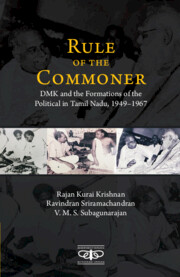Conclusion: Formations of the Political
Published online by Cambridge University Press: 15 June 2022
Summary
Whereas politics represents just one instance ofa social totality, the political refers to the waydiverse instances are disaggregated and mutuallyarticulated.
—Elias Jose Palti, AnArcheology of the PoliticalThe central argument of the book has been that theDravida Munnetra Kazhagam (DMK) accomplished thetask of construction of a people as Dravidian–Tamilthrough or alongside the formations of thepolitical. In borrowing Laclau's formulation ofpopulist reason, we have argued that Tamilfunctioned as the empty signifier that unified thepeople while the divide between Aryan–Dravidian orBrahmin–non- Brahmin functioned as the internalfrontier. We sketched this proposition throughChapters 1 and 2, providing a sum-up at thebeginning of Chapter 3. We will return to this laterto fully expand on its significance and also relateto two previous works on the DMK mobilization byMarguerite Ross Barnett and Narendra Subramanian. Wewill now focus on, in conclusion, our propositionrelated to the formations of the political. In acertain sense, formations of the political have alasting validity and importance that providesstability to the construction of a people. Ourunderstanding of the term “political” and itsformation in Tamil Nadu needs some parsing now.
POLITICAL: PLAY OF IMMANENCE ANDTRANSCENDENCE
In his recent work An Archaeologyof the Political, Elias Jose Palti hassuggested that it was with the separation of thespheres of immanence and transcendence and throughthe play of the two that a historical phase began inwhich regimes of power were organized in what cameto be referred to by the term “political.” He hassketched at least three distinct ages: “the age ofrepresentation” (the seventeenth and eighteenthcenturies), “the age of history” (the nineteenthcentury), and “the age of forms” (the late twentiethcentury). Without going into the details of theseepochs and logic corresponding to each, what weborrow for our own analysis is his formulationsuccinctly expressed in these terms: “The political,as we have seen, is a play ofimmanence/transcendence, and the different regimesof exercise of power we have been analyzing arediverse modes of production of the transcendenceeffect out of immanence, a justice effect” (Palti2017, 143).
- Type
- Chapter
- Information
- Rule of the CommonerDMK and Formations of the Political in Tamil Nadu, 1949–1967, pp. 258 - 276Publisher: Cambridge University PressPrint publication year: 2022



